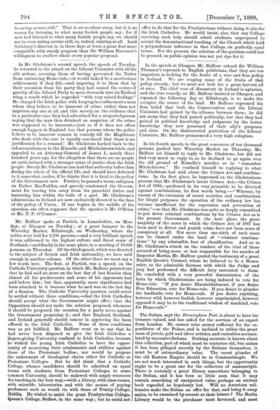Mr. Balfour spoke at Partick, in Lanarkshire, on Mon- day;
at Glasgow on Tuesday ; at a great banquet in the Waverley Market, Edinburgh, on Wednesday, where the tables were laid for 2,700 persons,—and a very brilliant speech it was, addressed to the highest culture and finest sense of Scotland,—and finally in the same place, to a meeting of 10,000 persons, on Thursday. Of the third speech, which was directed to the subject of Scotch and Irish nationality, we have said enough in another column. Of the other three we must say a few words here. The first, at Partick, was a speech on the Catholic University question, in which Mr. Balfour pointed out that he had said no more on the last day of last Session than almost all his predecessors and some of his opponents had said before him ; but that, apparently, more significance had been attached to it because what he said was on the last day of a Session. The Catholic University question could never be settled without three conditions,—that the Irish Catholics should accept what the Government might offer ; that the Opposition should not make the solution proposed, whenever it should be proposed, the occasion for a party move against the Government proposing it; and that England, Scotland, and Ireland generally should concur in approving the boon offered to the Irish Catholics. None of these conditions was as yet fulfilled. Mr. Balfour went on to say that he had never been disposed to give the Irish Catholics a degree-giving University confined to Irish Catholics, because he wished the young Irish Catholics to have the oppor- tunity of measuring their attainments and abilities against those of the Protestant bodies ; nor would he propose the endowment of theological chairs either for Catholic or Protestant Colleges. But he did think that a Catholic College, whence candidates should be admitted on equal terms with students from Protestant Colleges to some common University, should be endowed with ample resources for teaching in the beat way,—with a library, with class-rooms, with scientific laboratories, and with the means of paying professors such as would vie with those of Trinity College,
Dublin. He wished to assist the great Presbyterian College, Queen's College, Belfast, in the same way ; but he could not
offer to do that for the Presbyterians without doing it also for the Irish Catholics. He would insist, also, that any College receiving such help should admit students unprepared to accept the denominational teaching of the Church which held a preponderant influence in that College, on perfectly equal terms. For the present, the solution of the question could not be pressed, as public opinion was not yet ripe for it.






















































 Previous page
Previous page